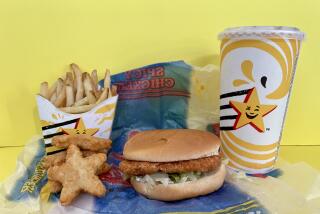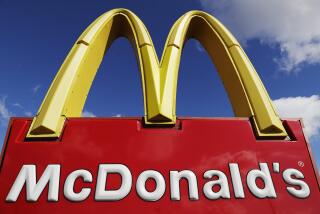Fast Food Can Feed Kids’ Fattening Habits
- Share via
The meat goes on.
McDonald’s recently announced it will begin offering a bigger version of the Happy Meal called the Mighty Kids Meal. Aimed at 8- through 10-year-olds, the fast-food combo grows from a single burger, cheeseburger or four Chicken McNuggets to a double hamburger, double cheeseburger or six nuggets.
“We understand that kids aged 8 to 10 have growing appetites and do not want to be identified as ‘little kids’ anymore,” said a McDonald’s marketing executive in a statement. “Our Mighty Kids Meal addresses these needs.”
Just this sort of associating a child’s needs with double cheeseburgers or two extra pieces of reconstituted, breaded, fried, frozen and reheated chicken is what most bothers Eric Schlosser in his new bestselling book, “Fast Food Nation: The Dark Side of the All-American Meal” (Houghton Mifflin).
“Fast-food companies are serving extremely high-fat food to people who are at the greatest risk of the health consequences from obesity [especially low-income families],” said Schlosser, a correspondent for Atlantic Monthly. “They could be selling low-cost food that doesn’t have the same health consequences, especially for children. The fast-food chains are creating eating habits that will last a lifetime.”
Those habits include super-size portions. Schlosser writes that the typical soft drink order in the late 1950s was 8 ounces. Today a “child’ order of soda at McDonald’s is 12 ounces, and a “large” soda is 32 ounces and 310 calories. In 1992, Super Size Fries were introduced at a whopping 25 grams of fat and 540 calories (research shows our bodies can process only about 800 calories at any one meal before excess calories are stored as fat).
Schlosser tells this story about an annual convention sponsored by the International Foodservice Manufacturers Assn. In a first-morning speech, one fast-food executive lauded the restaurant industry’s record profits the previous year, adding, “As if things weren’t good enough, consumers also dropped all pretense of wanting healthy food.” He explained that an industry survey showed Americans’ concerns about salt, fat and food additives--all staples for what makes fast food taste so good to so many people--were at their lowest levels since 1982.
The convention audience burst into applause.
While executives clap, Schlosser suggests more than pointing a finger. He recommends banning child-based ads that promote foods high in fat and sugar. He said it will not only prevent fat-laden diets but probably encourage fast-food companies to alter recipes.
Schlosser is the first to admit that fast-food companies are not completely to blame for the expanding waistlines of American kids, but he contends the industry has played a central role. There are twice as many overweight or obese children today as a generation ago. Schlosser does not see it as coincidence that other countries, including England and Japan, have experienced similar disturbing increases among kids. He said the rates of overweight children are unchanged in Italy and Spain, where fast food is less plentiful.
Although not taking issue with Schlosser’s book, nutritionist Ellyn Satter warns against oversimplifying why U.S. children are becoming fatter.
“Children are not fat because fast food exists,” said Satter, the Madison, Wis.-based author of “Secrets of Feeding a Healthy Family” (Kelcy Press). “In fact, children are great regulators of what they eat. Let be, they will eat what they need of any food, whether it’s high fat, low fat or high sugar.”
Satter doesn’t automatically reject fast-food meals, just the hurried nature of eating that tends to go with those breakfasts, lunches or dinners.
Research shows it takes about 20 minutes for our brains and stomachs to communicate that we are full. Kids, who can be blissfully unaware of minutes or hours, are capable of allowing this communication process to unfold. If you eat your meal faster than 20 minutes, Satter said, you risk eating more than you need. There is no time to self-regulate.
If we slow down our eating, according to Satter, we focus more on what we are eating. This awareness alone can make parents realize fast food may not be wholesome or nutritious enough for their children.
In any case, Satter doesn’t recommend feeling guilty about the occasional fast food.
“The most important thing at the table for a child is the parents,” Satter said. “It’s a chance to sit down together and for the child to get attention and be heard.”
There’s no better nourishment than that.
More to Read
Eat your way across L.A.
Get our weekly Tasting Notes newsletter for reviews, news and more.
You may occasionally receive promotional content from the Los Angeles Times.










